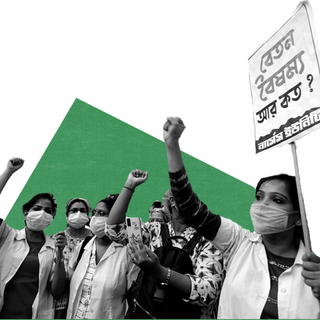
At Least 1,189 People Were Tortured in Police Custody In the Last 3 Years: Govt
Custodial torture has continued in a culture of impunity, with critics and people from marginalized backgrounds bearing the brunt.

In a Lok Sabha session on Tuesday, the government noted that at least 1,189 people were tortured and 348 people died in police custody between 2018-19 and 2020-21. The numbers are jarring, and many believe the actual figures mightbe much higher.
The break-up was given by the Union Minister of State for Home Affairs Nityanand Rai in a written reply. Rai cited data from the National Human Rights Commission.
The issue of custodial torture and deaths, which is frowned upon in any civilized society, is still very much a norm here and is perhaps India’s worst-kept secret. “Most deaths in police custody occur primarily as a result of torture,” a 2019 report noted. Of the 125 deaths in police custody, the report pointed out, 93 (74.4%) were due to alleged torture or foul play. Others died due to suspected suicide or illness. Earlier this week, a Dalit man in Uttar Pradesh was beaten to death in police custody.
Reports have also shown that despite the number of deaths recorded due to police brutality, the rate of conviction for perpetrators of such violence is marginal or non-existent. There has not been a single conviction in the cases of 500 people who died due to alleged torture in police custody between 2005 and 2018, the report noted.
The report claimed the police often try to cover up these heinous crimes by destroying incriminating evidence, not conducting post-mortems, or bycremating the bodies of victims. Jinee Lokaneeta, author of “The Truth Machines: Policing, Violence, and Scientific Interrogations in India” noted in The Wire how measures such as “third-degree interrogation” feed into a culture of normalizing torture. Inevitably, the lack of accountability creates absolute impunity.
This government data also revives the conversation on India’s stance on human rights and torture. The government of India has not ratified the United Nations Convention Against Torture (UNCAT) — making us one in only five countries that have yet to ratify the convention. Moreover, the government is yet to enact a national law against torture, meaning torture is not criminalized as a separate or special offense. In 2017, the Law Commission of India submitted the draft Prevention of Torture Bill, 2017 for enactment, but it hasn’t been cleared yet. In its response, the government noted it has proposed amendments to the Indian Penal Code, but experts note that they fall short.
Related on The Swaddle:
Telangana HC Orders Inquiry into Dalit Woman’s Death in Police Custody
Even while announcing the present data, the minister noted that public order and police are state subjects and it is beyond the purview of the central government.
“One of the reasons that the Government of India (GOI) is ignorant about torture is because there has been no consistent documentation of torture-related complaints. The National Crime Records Bureau (NCRB) does not document cases of custodial torture. The NHRC does deal with cases of torture in custody, but the annual figures related to such cases do not get reported in its reports,” Baljit Kaur noted in EPW.
Interestingly, India’s Attorney-General in 2017 stated that “India…believe[s] in peace, non-violence and upholding human dignity. As such, the concept of torture is completely alien to our culture and it has no place in the governance of the nation.”
The ignorance and hypocrisy is grating. “India’s silent acceptance of torture has made it a public secret,” Kaur added.
Why it’s imperative to look at what constitutes torture and how easily it slips under the radar is because of its use as a tool of oppression, extortion, and silencing dissent.
Studies in the past have pointed out how people from marginalized groups — including Muslims, SC, STs, and even women — bear the brunt of custodial violence. Instances of people being targeted because of their socio-economic circumstances crop up increasingly. Cases of a woman from the SC community who died in Telangana or the father-son duo in Tamil Nadu who died in custody last year reflect a grim reality.
Kafeel Khan, a doctor who was jailed during the pandemic, told The Swaddle: “They didn’t give me food for five days. I had to chew my clothes. I’d cry, scream, beg — urinating was like colic pain. They stripped me and beat me.”
Last week, people detained in Kashmir, including a 15-year-old boy, noted the extent of the brutal torture of civilians in police custody. “Whenever anybody is arrested, including the youth, they face physical torture during the first 15 or 20 days of their arrest. It hasn’t been widely reported because these detainees often only get released after six months,” Habeel Iqbal, a lawyer working on UAPA cases in Kashmir, told The Telegraph.
In 2019, of the 125 people killed in police custody, 75 people belonged to marginalized communities, 13 were Dalits or from tribal communities, 15 were Muslims, and 37 were people picked up for petty crimes.
Anne Gallagher, director-general, Commonwealth Foundation, noted that countries urgently need a new standard of relationship between the state and the citizen. “It is evident that all governments enjoy the status quo, where the police are used as a tool for self-preservation. Any disequilibrium is not politically desirable,” Ajit Prakash Shah, retired Chief Justice, noted in The Hindu.
Saumya Kalia is an Associate Editor at The Swaddle. Her journalism and writing explore issues of social justice, digital sub-cultures, media ecosystem, literature, and memory as they cut across socio-cultural periods. You can reach her at @Saumya_Kalia.
Related


Four Years After #MeToo, Justice Remains Elusive for Women Who Report Sexual Harassment At Work
